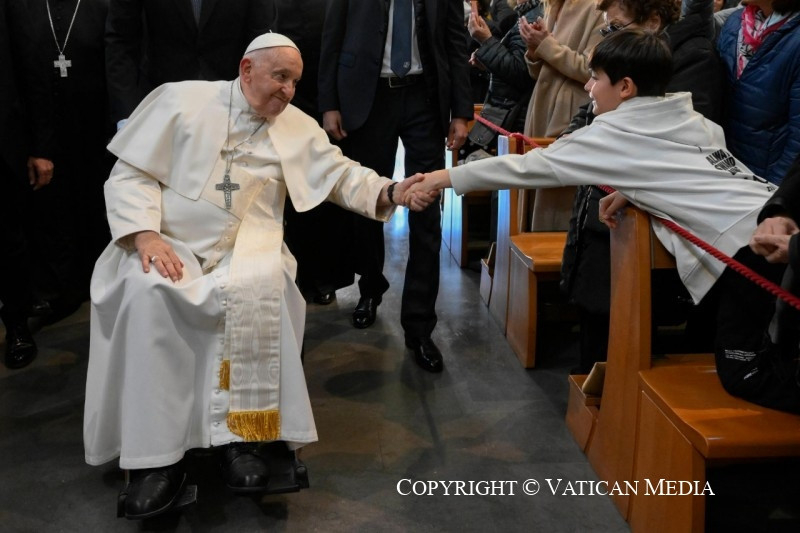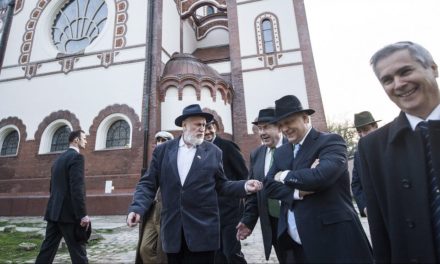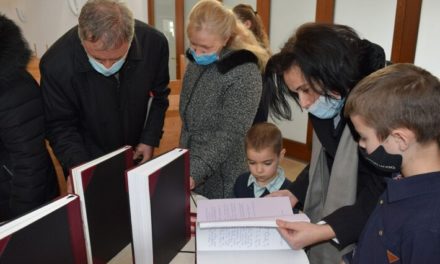On the afternoon of March 17, at the parish of Santa Maria delle Grazie al Trionfale, the Holy Father led a penitential liturgy combined with individual confession and absolution. This ceremony opened the Lenten prayer program "Twenty-four hours for the Lord", which is organized by the Dicastery for Evangelization. At the ceremony, the Holy Father himself made several believers confess.
Below is the full homily of Pope Francis.
Holy Father:
"What I once considered an advantage, I consider a disadvantage for Christ's sake" (Phil 3:7). This is what Saint Paul claims.
If we ask ourselves, what are the things that he no longer considers essential in his life, and in fact, he is happy to lose them in order to find Christ, we realize that these are not material realities, but "religious values". That's right: Paul was a pious, zealous man, a dutiful, law-abiding Pharisee (cf. Phil 3:5–6). Yet this religious attitude, which could have been his merit, glory, and sacred wealth, was actually an obstacle for him. That is why Paul says: "I rejected all these things and even considered them rubbish, so that I might gain Christ" (Phil 3:8). To everything that gave him a certain authority and fame, he says: "Just let it go, Christ is more important to me!"
Those who are too rich in themselves and in their own religious "excellence" imagine that they are true and different from others - how many times does this happen in the parish: "I belong to the Catholic Action, I help the priest, I collect..., me, me, me". how often does it happen that they think they are better than others; everyone ponders within himself whether this has sometimes happened to him—those who do so are content to keep up appearances; they feel in their place, but in this way they cannot make room for God, because they do not feel that they need a guardian.
Many times the "pure Catholics" who think they are righteous because they go to the parish, because they go to mass on Sundays, and boast that they are righteous: "No, I don't need anything, the Lord saved me." What could have happened to them? That
Their own "ego" has taken the place of God, and thus, although they say the prayers and perform sacred acts, they do not actually engage in dialogue with the Lord. They say a monologue, they don't have a dialogue, they don't pray. That is why the Scriptures remind us that only "the prayer of the poor penetrates the clouds" (Sir 35:21),Jesus offers us this teaching in the parable we heard (cf. Lk 18:9-14). It is about two people, a Pharisee and a tax collector, who both go to church to pray, but only one of them reaches the heart of God. Before they do anything, their posture speaks for itself: according to the Gospel, the Pharisee prayed "standing" (Lk 18:11), with his head raised, while the publican - in shame - "stood behind, not daring to raise his eyes to heaven" (Lk 18, 13). Let's think a little about these two postures!
The Pharisee stands. He is confident, he pulls himself together, he stands triumphantly, as someone to be admired for his excellence, as a role model. In this posture, he prays to God, but in fact he celebrates himself: I go to church, keep the precepts, give alms... Formally, his prayer is impeccable, on the outside we see a pious and reverent person, but instead of opening up to God to reveal the truth of his heart to him, hypocritically hides his infirmities. Many times we also make up our lives. This Pharisee does not expect salvation from the Lord as a gift, but almost demands it, as a reward for his merits. "I have completed the task, now give me the reward!" This man without hesitation - with his head held high - goes forward to the altar of God to take his place, in the first row, but in the end he goes too far and places himself before God!
My brothers, let us remember this: the Lord comes to us when we move away from our conceited selves.In this season of Lent, we too whisper with a broken heart, like the publican: "God, have mercy on me, a sinner!" (Luke 18:13). Let's say together: God, have mercy on me, a sinner! God, when I forget you or neglect you, when I put my own words and the words of the world before your word, when I imagine myself to be righteous and despise others, when I gossip about others, God, have mercy on me, a sinner! When I do not care about those around me, when I am indifferent to the poor and suffering, the weak and excluded, God, have mercy on me, a sinner! For my sins against life, for my bad testimony that tarnished the beautiful face of the Holy Mother Church, for my sins against the created world, God, have mercy on me, a sinner! For my lies, my dishonesty, my actions against transparency and legality, God, have mercy on me, a sinner! For my hidden sins that no one knows about, for the unintended harm caused to others, for the good that I could have done, but did not do, God, have mercy on me, a sinner!
Silently, with a repentant and hopeful heart, we repeat for a few minutes: God, have mercy on me, a sinner!In silence. Let everyone repeat in their hearts: God, have mercy on me, a sinner! In this act of repentance and trust, let us open ourselves to the joy of the greatest gift, God's mercy!
Source, full article: Magyar Kurír
Featured image: Vatican Media












